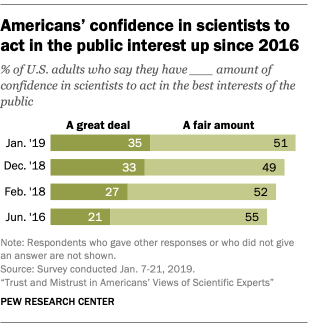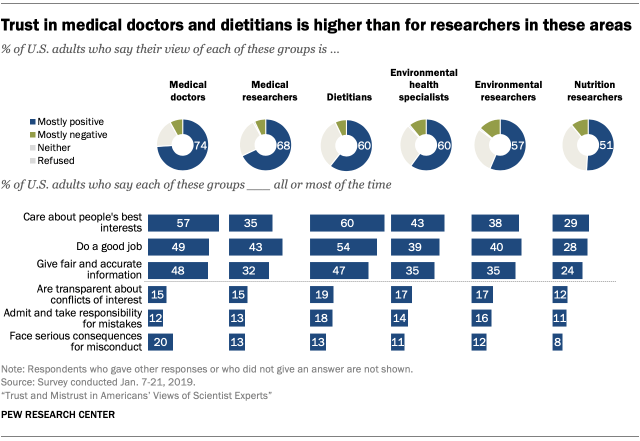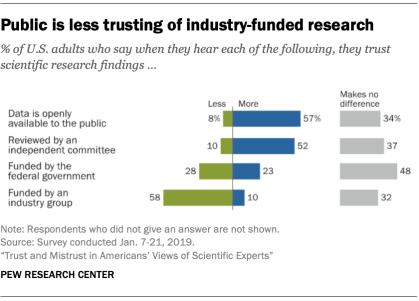Despite ongoing debates over science-related issues, Americans have broadly positive views of scientists and their work, according to a new Pew Research Center survey. But Americans are more tepid when it comes to trusting scientists’ competence, credibility and concern for the public interest – and they are largely skeptical of scientists’ transparency and accountability.
Here are five key findings about public trust in scientists, drawn from the new survey:
1 Public confidence in scientists to act in the public interest has increased in recent years. Overall, 35% of Americans say they have a great deal of confidence in scientists, up 14 percentage points from 2016. Americans have about the same level of confidence in scientists as they do in the military – and more than they do in some other groups and institutions, including the news media, business leaders and elected officials.
Public confidence in scientists to act in the public interest has increased in recent years. Overall, 35% of Americans say they have a great deal of confidence in scientists, up 14 percentage points from 2016. Americans have about the same level of confidence in scientists as they do in the military – and more than they do in some other groups and institutions, including the news media, business leaders and elected officials.
2Half or more of Americans have positive views about each of six professional groups asked about in the survey. The public is warmest toward medical doctors: About three-quarters (74%) say they have a mostly positive view of doctors, 18% are neutral and just 8% have a negative view. Majorities also have positive opinions of medical researchers (68%), dietitians (60%), environmental health specialists (60%) and environmental researchers (57%). About half (51%) have positive overall views of nutrition researchers.
3Majorities trust medical doctors and dietitians to care about their patients’ best interests, but trust in other scientists is lower. Respondents were asked whether scientists in each of the six specialties could be trusted to act with competence, to present their recommendations or research findings accurately, and to care about people’s best interests. Americans tend to trust practitioners in medicine and nutrition – who directly interact with patients – more than researchers in these areas. For example, a majority of Americans (57%) say medical doctors care about patients’ best interests all or most of the time, while far fewer (35%) say medical researchers always or usually care about the public’s interests. And 60% say dietitians care about their patients’ best interests all of most of the time, compared with 29% who say nutrition research scientists care about the public interest with the same frequency. But trust in environmental health specialists – practitioners who offer recommendations to organizations and community groups – is about the same as that for environmental researchers.

4Most turn a skeptical eye to issues of scientific integrity. Minorities of Americans believe scientists are transparent about potential conflicts of interest with industry all or most of the time. Shares saying this range from 12% to 19%, depending on the specific type of work being asked about. Similarly, few Americans (from 11% to 18%) think scientists admit and take responsibility for their mistakes all or most of the time. And small shares see repercussions for misconduct as commonplace: No more than two-in-ten U.S. adults say scientists in each field of work face serious consequences for misconduct all or most of the time.
5 Open access to data and independent review of research increase public confidence in research findings. The survey asked respondents about four factors that could affect their trust in research findings. More than half of Americans (57%) say they trust research findings more if the data from the study is openly available to the public, and 52% say they trust research findings more if they have been reviewed by an independent committee. In contrast, a majority of Americans (58%) say industry funding makes them trust scientific findings less. The influence of government funding on public trust is less clear: About a quarter (23%) say it makes the findings more trustworthy, 28% say it makes findings less trustworthy and about half (48%) say it makes no difference.
Open access to data and independent review of research increase public confidence in research findings. The survey asked respondents about four factors that could affect their trust in research findings. More than half of Americans (57%) say they trust research findings more if the data from the study is openly available to the public, and 52% say they trust research findings more if they have been reviewed by an independent committee. In contrast, a majority of Americans (58%) say industry funding makes them trust scientific findings less. The influence of government funding on public trust is less clear: About a quarter (23%) say it makes the findings more trustworthy, 28% say it makes findings less trustworthy and about half (48%) say it makes no difference.





